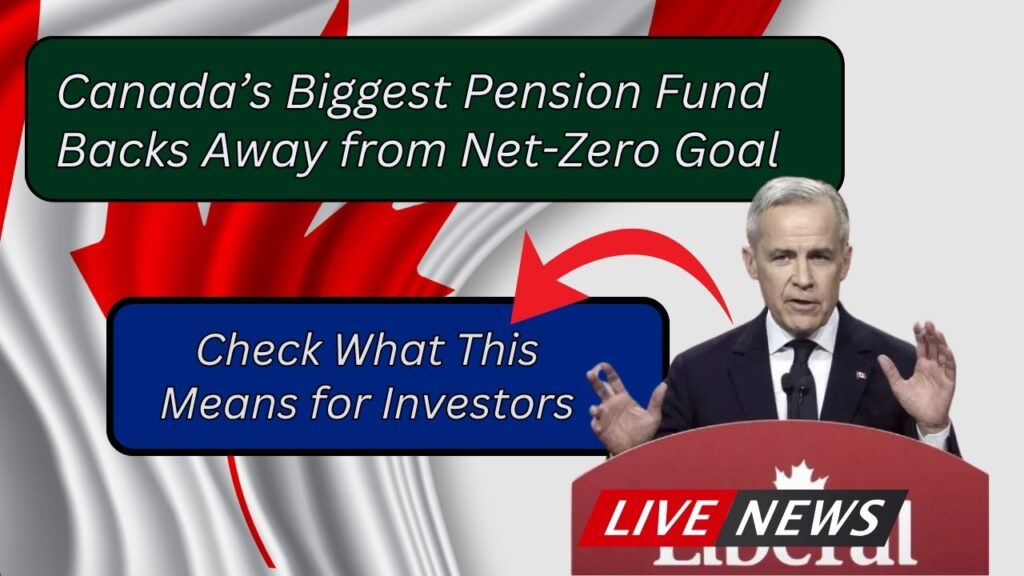Canada’s Biggest Pension Fund Backs Away from Net-Zero Goal: Check What This Means for Investors
Biggest Pension Fund Backs Away from Net-Zero Goal – The Canada Pension Plan Investment Board (CPPIB)—the nation’s largest pension fund managing over $570 billion CAD—just pulled back from a major climate pledge. In 2022, CPPIB joined a global movement to hit net-zero greenhouse gas emissions by 2050, aligning with climate-conscious investors worldwide. But fast forward to May 2025, and that commitment is now history.

This unexpected move could have long-term consequences—not only for how our pensions are managed, but also for the entire ESG investment landscape in North America.
Biggest Pension Fund Backs Away from Net-Zero Goal
| Aspect | Details |
|---|---|
| Fund Name | Canada Pension Plan Investment Board (CPPIB) |
| Assets Under Management | ~$570 Billion CAD |
| Previous Climate Goal | Net-zero emissions by 2050 |
| Status | Withdrew pledge in May 2025 |
| Reason Cited | Legal uncertainty from Canada’s revised Competition Act |
| Carbon Performance | Reduced 41% emissions since 2020 |
| Investor Impact | ESG credibility and portfolio risk under scrutiny |
| Global Peers | CalPERS (USA) and GPFG (Norway) still committed |
| Official Site | cppinvestments.com |
CPPIB’s move to step away from a net-zero emissions goal is a watershed moment for Canadian investing. While the fund insists it’s still supporting a climate transition, this signals a shift from goal-driven to strategy-flexible investing—something that may worry climate-conscious contributors and investors.
This isn’t the end of ESG. It’s the next chapter. Whether you’re a retiree, millennial investor, or financial advisor, one thing’s clear: climate accountability is no longer just about pledges—it’s about proof.
CPPIB’s Net-Zero U-Turn — What Happened?
At the core of CPPIB’s reversal lies a major legal shake-up. Canada’s Competition Act now enforces strict scrutiny on green marketing claims, cracking down on what’s known as greenwashing. That means anyone—pension funds included—who claims they’re on a climate-friendly path must back it up with clear, measurable action.
CPPIB’s rationale? The fear that sticking rigidly to a net-zero roadmap could land them in court—or force them into bad investment decisions just to hit arbitrary carbon targets.
In a statement, CPPIB emphasized it’s still committed to “supporting the transition to a low-carbon economy,” just not under “rigid constraints or political pressure.”
What Did CPPIB Promise Before?
Let’s rewind a bit. Back in 2022, CPPIB joined the chorus of major global investors pledging to hit net-zero emissions by 2050. It promised:
- Carbon footprint reduction across the portfolio
- Climate-aligned investment strategies
- Transparency in reporting environmental progress
The fund even joined net-zero alliances and backed shareholder proposals urging companies to green up.
Now, with that 2050 target off the table, critics are asking: What’s the plan?
How Other Pension Giants Stack Up?
CPPIB isn’t alone on the global stage. Let’s see how it compares with peers:
CalPERS (USA): Still committed to net-zero by 2050. Publicly reports progress and pressures companies on climate disclosures.
Norway’s GPFG: The world’s largest sovereign wealth fund supports net-zero transitions and divests from fossil fuel laggards.
Ontario Teachers’ Pension Plan (Canada): Reaffirmed its 2050 net-zero target and set interim goals for 2025 and 2030.
In contrast, CPPIB now stands out for backing away—putting itself in an awkward position as the largest yet least-committed Canadian fund in the climate game.
Climate Advocates Aren’t Happy
Organizations like Shift Action for Pension Wealth and Planet Health are calling CPPIB’s move “a failure of leadership and fiduciary duty.”
They argue the fund isn’t just walking away from climate goals—it’s putting retirement savings at risk by ignoring the financial consequences of climate change, including:
- Devalued assets (stranded fossil fuel investments)
- Regulatory crackdowns
- Physical climate risks (like wildfires, floods, etc.)
In response, ShiftAction.ca published a detailed critique comparing CPPIB with more climate-responsible funds.
What the Law Actually Says?
Canada’s amended Competition Act now demands that companies prove environmental claims with solid, verifiable data. This includes:
- Lifecycle emissions disclosures
- Avoiding misleading future pledges
- Proving how climate targets affect investment decisions
CPPIB’s legal advisors likely saw litigation risk if future carbon targets were missed, especially without crystal-clear metrics.
What Investors Should Do Now?
If you’re an investor, contributor, or advisor—don’t just shrug this off. Here’s your cheat sheet:
Review CPPIB Holdings
Look at where your money is. If you’re holding CPPIB-linked funds, check their exposure to fossil fuels and carbon-heavy industries.
Explore ESG Ratings
Use services like MSCI ESG, Morningstar Sustainability Ratings, or Sustainalytics to vet your portfolio’s climate integrity.
Ask the Hard Questions
Write to CPPIB or your investment fund manager. Ask about their revised climate strategy. Hold them accountable.
Hedge with Green ETFs
Diversify into climate-forward ETFs like iShares Clean Energy or Invesco Solar ETF if you’re worried about long-term risk.
Pension Boost for Canadian Seniors in 2025 — Check If You’re Getting Up to $1,364 Extra
$840 Benefit Ahead As Canada’s Tax Rate Cut Becomes Effective July 2025: Check Details!
Canada Child Benefit Payment Scheduled For July 18: Check Eligibility Criteria and Payment Details!
FAQs About Biggest Pension Fund Backs Away from Net-Zero Goal
Q1: Is CPPIB abandoning climate action entirely?
No. They’ve stepped away from a formal net-zero goal but still invest in sustainability-oriented strategies.
Q2: Why should this matter to average Canadians?
CPPIB invests your retirement money. Poor climate risk management could affect long-term financial returns.
Q3: Can this affect ESG indexes?
Yes. Funds that fail to meet climate benchmarks risk being excluded from ESG ETFs and climate-aligned indexes.
Q4: Will other funds follow CPPIB’s lead?
Possibly. Some banks and funds are reconsidering climate commitments due to legal liabilities.
Q5: Can I move my retirement savings away from CPPIB?
Direct CPP contributions are mandatory, but you can allocate personal investments elsewhere—like ESG-certified mutual funds or robo-advisors.







